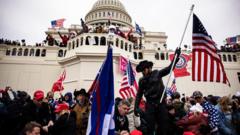The special counsel's report on Donald Trump's conduct following the 2020 presidential election presents a nuanced perspective of the events leading up to and during the January 6 riot. Released after a two-year investigation by Special Counsel Jack Smith, the 140-page document synthesizes findings from previous congressional inquiries and court filings but also introduces fresh insights regarding Trump’s behavior and intentions.
1. **Trump's Inflammatory Rhetoric:** The report asserts that Trump's speech on January 6 inspired his supporters to commit acts of violence during the assault on the Capitol. It notes that, despite Trump’s calls for his followers to "peacefully" make their voices heard, he used the term "fight" excessively. While Trump has portrayed the riot as mischaracterized, his words are positioned as a catalyst for the day's violence.
2. **Absence of Incitement Charges:** Despite contemplating an "incitement to insurrection" charge against Trump, the report indicates that prosecutors ultimately did not find sufficient direct evidence to support such a claim. Smith’s team believed there were "other powerful charges available," suggesting a strategic decision to avoid pursuing incitement, which hinges on proving intent to incite widespread violence.
3. **Rioters' Justifications Linked to Trump:** Testimonies from individuals convicted for their roles in the Capitol riot reveal that many cited Trump's words as a driving force behind their actions. The report quotes rioters claiming they were acting upon Trump’s directives, albeit acknowledging the potential motivations behind their statements.
4. **Pressure on Mike Pence:** The report details Trump’s intense efforts to persuade Vice President Mike Pence to refuse certification of the election results, claiming that failure to comply would result in widespread public outrage against him. Despite this pressure, Pence stood firm, which was followed by the violent chants from Trump supporters against him during the riot, illustrating the dangerous fallout of Trump's insistence.
5. **Impact on Law Enforcement:** The report sheds light on the traumatizing experiences faced by law enforcement officers on duty during the Capitol breach, with over 140 officers assaulted. Many officers reported lasting psychological effects, including depression and survivor's guilt, underlining the severe consequences not only for those at the Capitol but for public trust in law enforcement.
As Trump continues to declare his innocence and criticize Smith's findings, the report presents a critical analysis of his actions and their aftermath, highlighting stark divides in American political and social discourse.






















